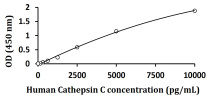ARG83261
Human Cathepsin C ELISA Kit
Human Cathepsin C ELISA Kit for ELISA and Human
Overview
| Product Description | ARG83261 Human Cathepsin C ELISA Kit is an Enzyme Immunoassay kit for the quantification of Human Cathepsin C in Serum, Plasma and Cell culture supernatants. |
|---|---|
| Tested Reactivity | Hu |
| Tested Application | ELISA |
| Specificity | There is no detectable cross-reactivity with other relevant proteins. |
| Target Name | Cathepsin C |
| Conjugation | HRP |
| Conjugation Note | Substrate: TMB and read at 450 nm. |
| Sensitivity | 100 pg/ml |
| Detection Range | 156 pg/ml - 10,000 pg/ml |
| Sample Type | Serum, Plasma and Cell culture supernatants |
| Precision | Intra-Assay CV: 5.5% Inter-Assay CV: 4.3% |
| Alternate Names | CTSC; Cathepsin C; Dipeptidyl Peptidase 1; DPP1; Dipeptidyl Transferase; Cathepsin J; EC 3.4.14.1; DPP-I; CPPI; DPPI; PALS; PLS; Dipeptidyl-Peptidase I; Dipeptidyl Peptidase I; PDON1; HMS; JPD; JP |
Application Instructions
| Assay Time | ~ 5 hours |
|---|
Properties
| Form | 96 well |
|---|---|
| Storage Instruction | Store the kit at 2-8°C. Keep microplate wells sealed in a dry bag with desiccants. Do not expose test reagents to heat, sun or strong light during storage and usage. Please refer to the product user manual for detail temperatures of the components. |
| Note | For laboratory research only, not for drug, diagnostic or other use. |
Bioinformation
| Database Links | |
|---|---|
| Gene Symbol | CTSC |
| Gene Full Name | Cathepsin C |
| Background | This gene encodes a member of the peptidase C1 family and lysosomal cysteine proteinase that appears to be a central coordinator for activation of many serine proteinases in cells of the immune system. Alternative splicing results in multiple transcript variants, at least one of which encodes a preproprotein that is proteolytically processed to generate heavy and light chains that form a disulfide-linked dimer. A portion of the propeptide acts as an intramolecular chaperone for the folding and stabilization of the mature enzyme. This enzyme requires chloride ions for activity and can degrade glucagon. Defects in the encoded protein have been shown to be a cause of Papillon-Lefevre syndrome, an autosomal recessive disorder characterized by palmoplantar keratosis and periodontitis. |
| Function | Activates serine proteases such as elastase, cathepsin G and granzymes A and B. |
| Cellular Localization | Lysosome |
| PTM | Disulfide bond, Glycoprotein, Zymogen |
Images (1) Click the Picture to Zoom In
| Title | Download Link |
|---|---|
| ARG83261 Human Cathepsin C ELISA Kit User manual |
 Download Download
|






